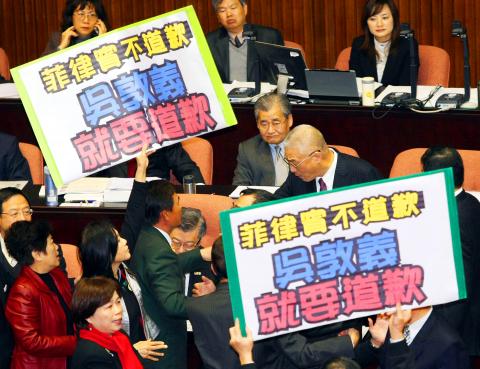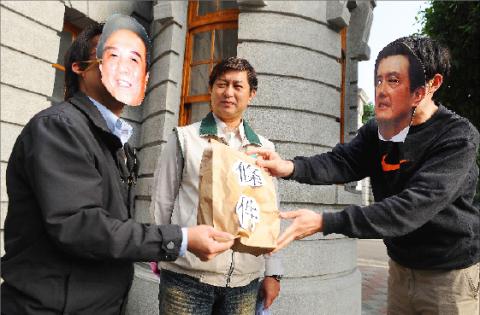President Ma Ying-jeou (馬英九) yesterday expressed displeasure with Manila over a diplomatic dispute that has chilled relations between the two countries, reiterating a demand that the Philippines apologize for deporting 14 Taiwanese fraud suspects to China earlier this month.
During a meeting with Philippine Senator Manuel Roxas, who was dispatched by Manila to mend fences with Taipei, at the Presidential Office in the morning, Ma said he had agreed to meet the special envoy “with a heavy heart.”
“Our government and the people are very angry with the improper expulsion of 14 of our citizens to China,” he said. “I am seeing you today because I think that long-term friendship and cooperation between the Republic of China [ROC] and the Philippines are important … How your country handles the matter from now on will serve as an important reference for how we develop bilateral ties.”

Photo: CNA
Ma said the Philippines made three major mistakes during the process.
While the Taiwanese were expelled from the Philippines, Philippine officials said they were extradited. They were also not sent to their native country — the ROC — a move Ma said seriously violated international law and practices.
The 14 Taiwanese were all ROC citizens who legally entered the Philippines with proper documents. However, the Philippine government claimed they did not have legal travel documents.

Photo: Chu Pei-hsiung, Taipei Times
“Your government officials lied openly,” Ma said.
Finally, Taiwanese authorities had obtained a restraining order from a Philippine court.
However, Manila ignored its legal provisions and “illegally sent our people to China,” Ma said.
“This is not what a democratic country should do,” he said.
Ma said Manila must be held responsible for the mistakes and apologize, a message he asked Roxas to convey to Philippine President Benigno Aquino III.
Meanwhile, the Ministry of Foreign Affairs said Taipei and Manila had achieved a seven-point consensus over the incident.
A “fact sheet” provided to media and dated Feb. 22, 1:23am, showed that Philippine authorities would take punitive action against officials who were involved in wrongdoing in deporting the 14 Taiwanese, which Taipei would interpret as “a kind of apology.”
The conclusion was one of the seven points drawn up during 11 hours of negotiations between Minister of Foreign Affairs Timothy Yang (楊進添) and Roxas on Monday.
Premier Wu Den-yih (吳敦義) and Yang both reiterated their call on Manila to apologize for the situation.
Asked at a press conference if the government would accept an apology by some Philippine officials for “negligence of duty” and regard it as a formal apology, Yang was noncommittal, only saying that it would depend on the results of an investigation into possible wrongdoing by the Philippine officials involved in the case.
“Some Philippine officials were involved in serious wrongdoing and engaged in deception in handling the case. We have demanded that an investigation be launched against those officials, and they have to apologize to us,” Yang said.
Yang called the press conference at 11am following Ma’s meeting with Roxas.
At about the same time that the press conference was being held, Wu told the legislature that the administration had not changed its position on demanding that the Philippines apologize.
“Minister Yang told the Philippines on Feb. 18 that they had to apologize to Taiwan if it sent a special envoy to Taiwan,” Wu said.
Wu on Sunday said an apology by Roxas was a necessary condition for the visit.
Roxas repeatedly said the Philippines “deeply regretted” the -incident during his talks with Yang and Ma, but came short of a full apology.
Democratic Progressive Party legislators shot back at Wu, accusing the government of agreeing to hold the meeting between Ma and Roxas despite Manila’s refusal to apologize.
DPP Legislator Chen Ting-fei (陳亭妃) said Wu appeared to be “out of the loop” regarding the diplomatic standoff between Taiwan and the Philippines.
“Ma should have never met Roxas. It’s degrading to our national dignity,” DPP Legislator Wong Chin-chu (翁金珠) said. “If the Philippines really wanted to apologize, [the Philippine] presidential palace should have just released a statement.”
In response, Wu said Roxas had proposed concrete suggestions and that both sides had agreed to make further efforts to resolve the situation.
The possibility exists that the case could be settled in a way that conforms to our demands and expectations, Wu said.
Yang said he had suggested that Ma meet Roxas at 2am yesterday, as Roxas had put forward measures to prevent similar cases from happening again.
According to the “fact sheet,” the “Philippines side is willing to sit down immediately to begin discussions for the establishment of a mechanism for cooperation and mutual assistance in dealing with these kinds of crimes, particularly those involving nationals of the two sides” and to launch “talks to determine the feasibility of beginning negotiations for an Economic Partnership Agreement.”
Yang said Taiwan had used the opportunity of Ma’s meeting with Roxas to “send a strong message” to the Philippines that it must apologize to Taiwan.
Also included in the fact sheet that Roxas conveyed was the message that “President Aquino views this recent unfortunate incident with great concern and desires to repair the damage this has caused in the relations between the two countries.”
In accordance with the fact sheet, Roxas said he “took cognizance of serious allegations by the Taiwan side of possible lapses and mishandling by Philippine immigration authorities” and that he “will report this directly to Aquino, including Taiwan’s strong demand for an apology.”
Roxas also assured Yang that “there was never any intention on the Philippines side to put at risk the long-standing good relations between the two countries.”
In related developments, political commentators blamed Ma for the diplomatic incident.
Lo Chih-cheng (羅致政), chief executive of Taiwan Brain Trust, said Ma’s expressions of displeasure with Manila were useless because his China policy had confused the international community to such an extent that its members believed Taiwan was part of China.
“China’s Taiwan policy is clear,” he said. “It wants to change the de facto ‘one China’ to de jure ‘one China.’”
Lai I-chung (賴怡忠), a researcher at Taiwan Thinktank, said Ma had no one to blame but himself, because he insisted that Taiwan and “the mainland” are both part of China.
Lin Cheng-yi (林正義), a researcher at the Institute of European and American Studies at Academia Sinica, urged the justice department of the Philippines to apologize and for the Ministry of Foreign Affairs to seek judicial assistance with Manila and other Southeast Asian countries.
Tung Li-wen (董立文), a professor at the Graduate School of Public Security at Central Police University, said he feared Association for Relations Across the Taiwan Strait Chairman Chen Yunlin (陳雲林) would use the 14 Taiwanese as a political tool and announce their extradition during his visit this week.
ADDITIONAL REPORTING BY VINCENT Y. CHAO

FALSE DOCUMENTS? Actor William Liao said he was ‘voluntarily cooperating’ with police after a suspect was accused of helping to produce false medical certificates Police yesterday questioned at least six entertainers amid allegations of evasion of compulsory military service, with Lee Chuan (李銓), a member of boy band Choc7 (超克7), and actor Daniel Chen (陳大天) among those summoned. The New Taipei City District Prosecutors’ Office in January launched an investigation into a group that was allegedly helping men dodge compulsory military service using falsified medical documents. Actor Darren Wang (王大陸) has been accused of being one of the group’s clients. As the investigation expanded, investigators at New Taipei City’s Yonghe Precinct said that other entertainers commissioned the group to obtain false documents. The main suspect, a man surnamed

DEMOGRAPHICS: Robotics is the most promising answer to looming labor woes, the long-term care system and national contingency response, an official said Taiwan is to launch a five-year plan to boost the robotics industry in a bid to address labor shortages stemming from a declining and aging population, the Executive Yuan said yesterday. The government approved the initiative, dubbed the Smart Robotics Industry Promotion Plan, via executive order, senior officials told a post-Cabinet meeting news conference in Taipei. Taiwan’s population decline would strain the economy and the nation’s ability to care for vulnerable and elderly people, said Peter Hong (洪樂文), who heads the National Science and Technology Council’s (NSTC) Department of Engineering and Technologies. Projections show that the proportion of Taiwanese 65 or older would

The government is considering polices to increase rental subsidies for people living in social housing who get married and have children, Premier Cho Jung-tai (卓榮泰) said yesterday. During an interview with the Plain Law Movement (法律白話文) podcast, Cho said that housing prices cannot be brought down overnight without affecting banks and mortgages. Therefore, the government is focusing on providing more aid for young people by taking 3 to 5 percent of urban renewal projects and zone expropriations and using that land for social housing, he said. Single people living in social housing who get married and become parents could obtain 50 percent more

Democracies must remain united in the face of a shifting geopolitical landscape, former president Tsai Ing-wen (蔡英文) told the Copenhagen Democracy Summit on Tuesday, while emphasizing the importance of Taiwan’s security to the world. “Taiwan’s security is essential to regional stability and to defending democratic values amid mounting authoritarianism,” Tsai said at the annual forum in the Danish capital. Noting a “new geopolitical landscape” in which global trade and security face “uncertainty and unpredictability,” Tsai said that democracies must remain united and be more committed to building up resilience together in the face of challenges. Resilience “allows us to absorb shocks, adapt under